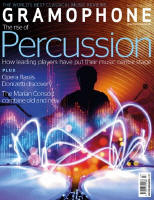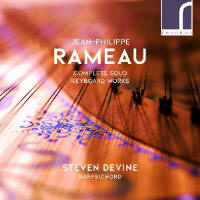Texte paru dans: / Appeared in: |
|
|
Outil de traduction (Très approximatif) |
|
|
Reviewer:
Jed Distler According to Devine’s excellent and informative booklet notes, the Indes galantes transcriptions are essentially short-score reductions of the orchestral originals, not specifically conceived as harpsichord pieces in and of themselves. For example, some pieces are printed on three staves and contain more material than two hands can manage (Robin Bigwood helps out on three selections), while other textures appear relatively thinned out or ‘incomplete’ in relation to their more detailed orchestral counterparts. On the other hand, Rameau often modifies the pieces with additional counterpoint, harmonic alterations and specific directives in regard to ornamentation. As before, Devine uses an attractively dulcet copy of a 1636 Ruckers harpsichord. Its clear yet well-rounded sonority lends itself well to Devine’s meticulous technique and sensitivity in registration. For example, the sparse textures in Air pour les Amants et Amantes sound songful rather than threadbare by virtue of Devine’s thoughtful agogic elongations of specific phrase-endings and individual notes. His employment of the lute stop in the Gavotte creates a bristling impression not easily forgotten; the same can be said about Air pour Zéphire as it floats about in the highest register. In Air pour Borée et la Rose, Devine may not match Kenneth Gilbert’s Harmonia Mundi recording (2/80) for sheer thrust and abandon, yet he brings more contrast and disparate character to each little section. Devine’s lilting, keyboard-orientated shaping of the Overture and the First Air pour les Bostangis markedly contrast to the heftier, incisive impression left by Christophe Rousset’s more closely miked interpretation (Ambroisie, 12/09). Much as I appreciate Devine’s flexible and intimately scaled rendition of La Dauphine, I find that Trevor Pinnock’s firmer pulse and more straightforward phrasing enhances the music’s variety and profile (CRD, 6/76). Collectors wanting a ‘completer than complete’ Rameau cycle will find Devine to be a musician who obviously knows what he wants to get from the music and who commands the means to communicate his conceptions. For the basic Rameau keyboard canon, however, Mahan Esfahani’s audacious creativity and palpable joy (Hyperion, 12/14) lure me back again and again, as do the spacious grandeur of Michel Kiener’s antipodal interpretations, once available on Harmonia Mundi (2/04) and urgently in need of reissue. |
|




